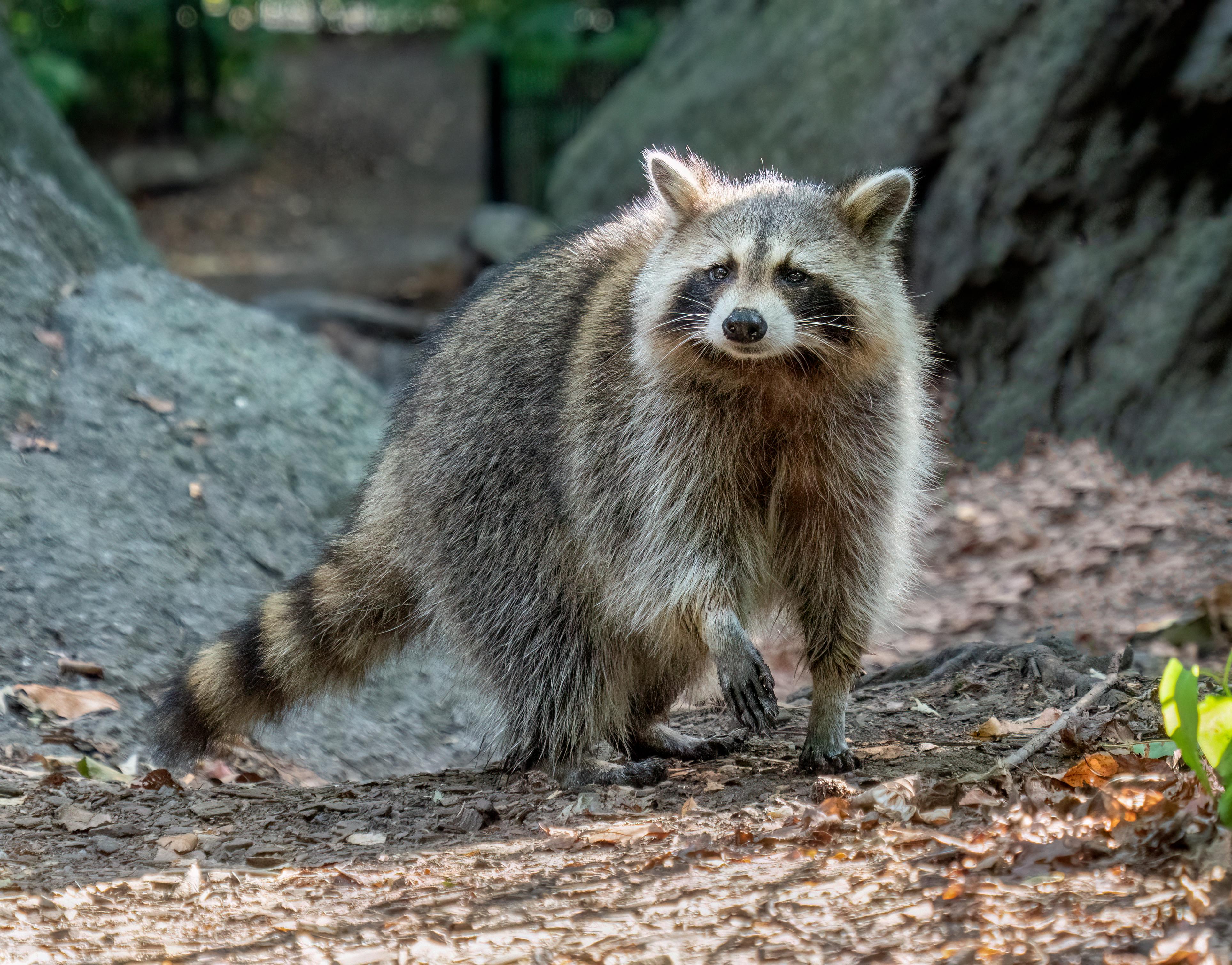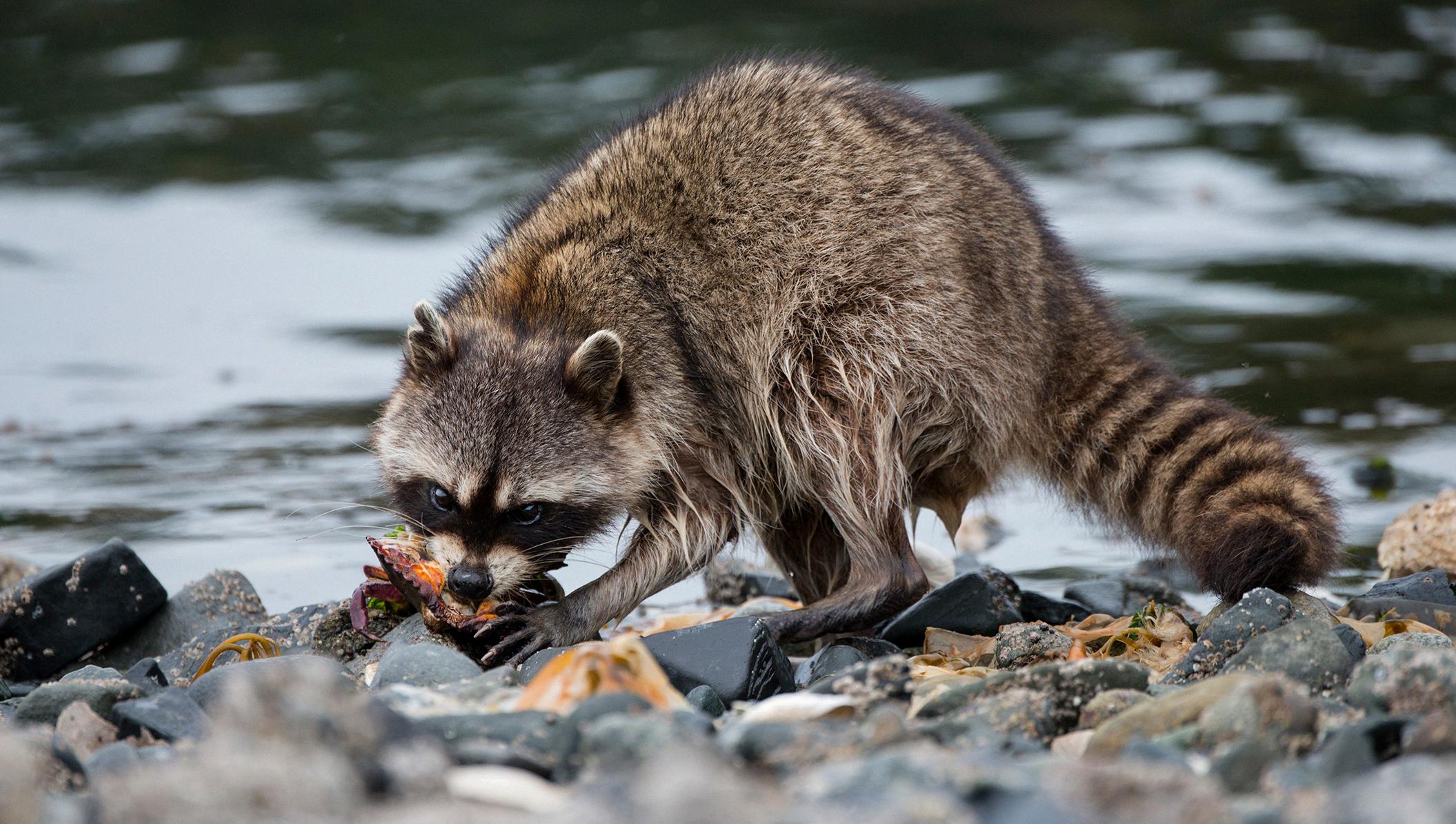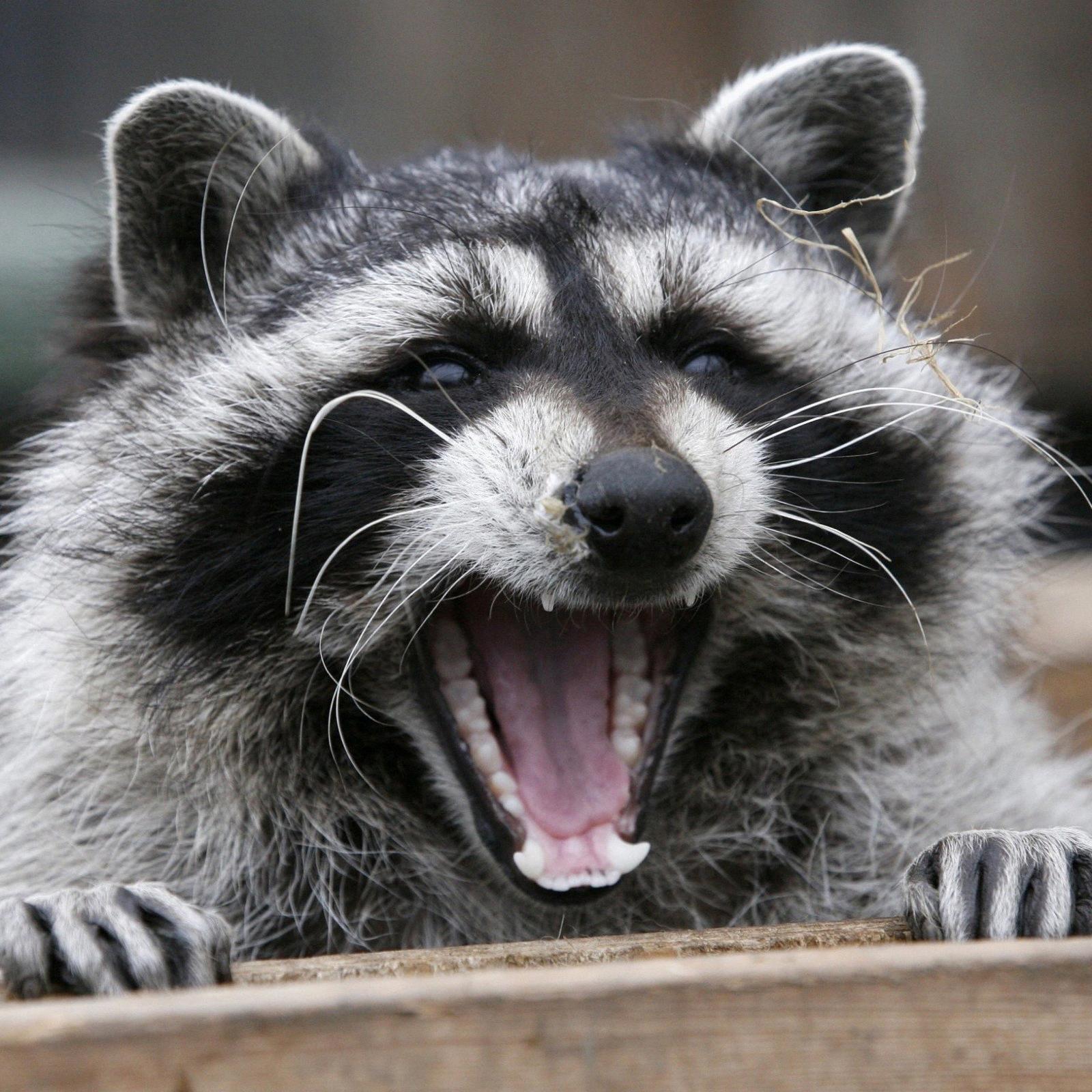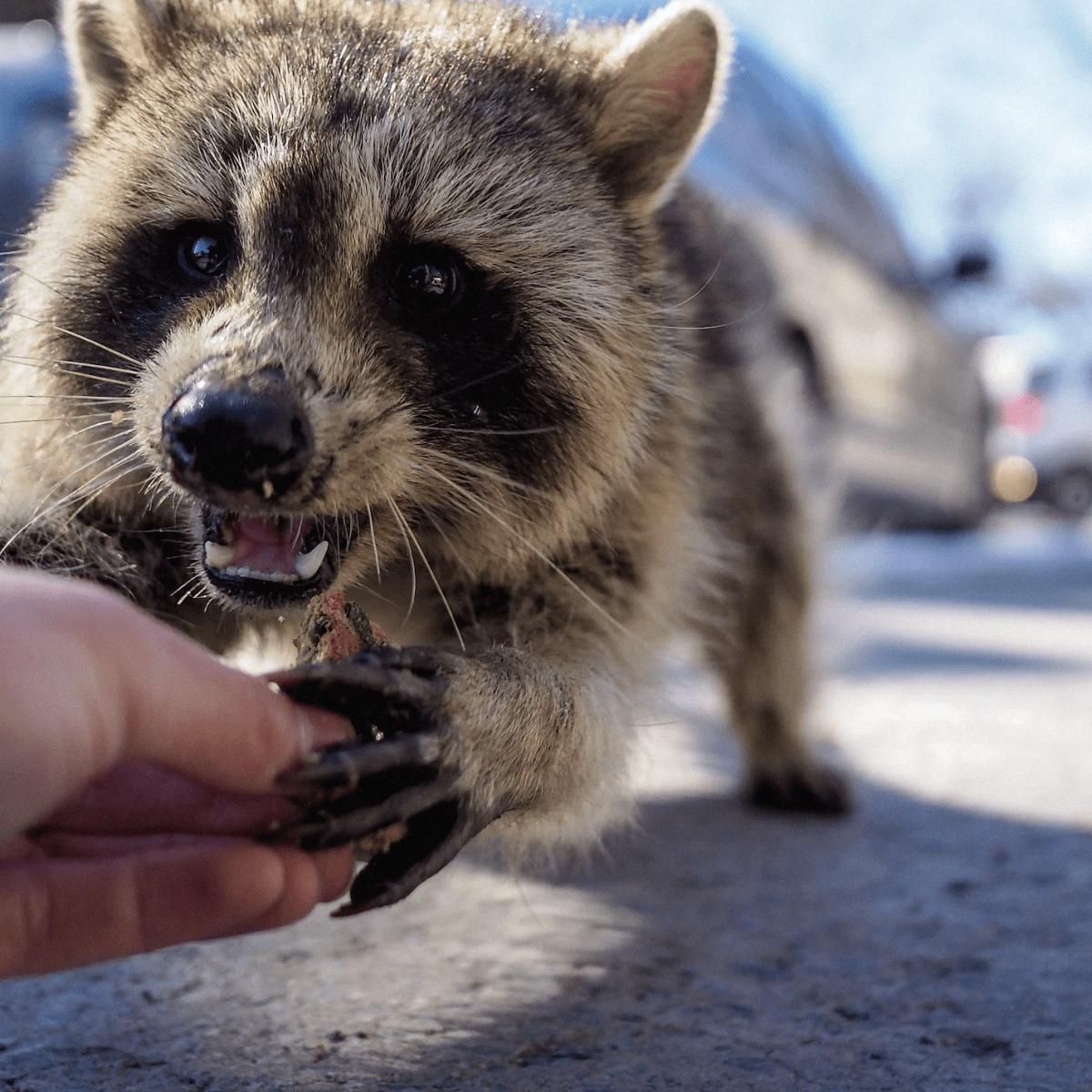Raccoons are fascinating animals that are known for their distinctive mask-like markings and ringed tails. These nocturnal creatures are found throughout North America, and are known for their intelligence and dexterity. One question that often arises when discussing raccoons is whether or not they have opposable thumbs.
The short answer is no, raccoons do not have opposable thumbs. However, this does not mean that they are unable to manipulate objects with their paws. In fact, raccoons have incredibly dexterous front paws that are similar in shape to a human hand. They feature five slender, finger-like toes, which allow them to easily grasp and hold onto objects.
While raccoons do not have opposable thumbs, they do have a high degree of tactile sensitivity in their front paws. Their paws are covered in specialized hairs that allow them to easily locate and identify objects by touch. Compared to most mammals, raccoons have four to five times more sensory cells in their paws. Additionally, 75 percent of the part of their brain that processes sensory signals is devoted to touch.
This heightened sense of touch allows raccoons to navigate their environment with ease. They are able to find food, climb trees, and manipulate objects with remarkable dexterity. They are also able to sense changes in their environment, such as shifts in temperature or the presence of predators, throgh their sensitive paws.
While raccoons may not have opposable thumbs, they are still incredibly skilled at using their paws to manipulate objects. Their dexterity and sensitivity make them one of the most adaptable and intelligent creatures in the animal kingdom. So, the next time you see a raccoon in the wild, take a moment to appreciate their remarkable paws and their incredible ability to navigate the world around them.
Animals With Opposable Thumbs
Animals with opposable thumbs include primates such as humans, gorillas, chimpanzees, orangutans, and other variants of apes. However, there are other animals with an opposable digit of some sort, including certain frogs, koalas, pandas, possums and opossums, and many birds. It’s worth noting that many dinosaurs also had opposable digits. While the majority of the animals with opposable thumbs are primates, there are a few exceptions that have evolved this trait independently due to their specific needs and environments. Overall, the opposable thumb is a unique and highly useful adaptation that is found in various animals.

Source: en.wikipedia.org
Do Raccoons Have Opposable Thumbs?
No, raccoons do not have opposable thumbs. While their front paws do have digits that resemble fingers, they lack the ability to grasp and manipulate objects like humans and some primates do. The paws of raccoons are similar in shape to those of weasels or ferrets, with no webbing between the toes. While they may be able to use their paws to hold onto objects or climb trees, they do not have the fine motor skills associated with opposable thumbs.
Do Raccoons Possess Human-Like Hands?
Yes, raccoons have hands that resemble human hands in their shape and function. Both their front and rear paws have five slender, finger-like toes that allow them to grasp and manipulate objects with dexterity. In fact, raccoons are known for their ability to use their front paws to open latches, jars, and other containers. Additionally, their front paws are extremely sensitive and contain specialized hairs that enable them to locate and identify objects by touch. So, while raccoons are not humans, they do have hands that are similar in many ways to ours.
The Sensitivity of Raccoon Hands
Raccoon hands, also known as paws, are extremely sensitive to touch. In fact, they have four to five times more sensory cells in their paws than most mammals. This makes them excellent climbers and allows them to feel their way around in the dark. In addition, 75 percent of the part of the raccoon’s brain that processes sensory signals is devoted to touch. This high level of sensitivity in their paws allows raccoons to detect even the slightest changs in their environment and adapt accordingly. Overall, the sensitivity of raccoon hands is truly remarkable and plays a vital role in their survival.
Do Squirrels and Raccoons Have Opposable Thumbs?
No, squirrels and raccoons do not have opposable thumbs. Opposable thumbs are a unique feature of primates, and while some other animals have grasping abilities with their paws or feet, they do not have true opposable thumbs. Squirrels and raccoons have flexible paws with long digits that allow them to manipulate objects with precision, but their paws lack the distinctive joint that allows primates to grasp and hold onto objects with precision. Despite this, their paws are still highly adapted for their survival in their respective environments.

Source: hakaimagazine.com
Do Raccoons Have Fingerprints?
No, raccoons do not have fingerprints. Instead, they have small, densely packed epidermal domes that each overlie a cone-shaped dermal papilla. These epidermal domes are unique to each individual raccoon and can be used for identification purposes, similar to fingerprints in humans. However, they are not actual fingerprints as they do not have the distinct ridges and patterns that are found in human fingerprints.
The Risk of Raccoon Bites
Yes, raccoons can bite you. Raccoons are wild animals and can be very aggressive if they feel threatened or cornered. They have sharp teeth and strong jaws that can cause serious injury. In addition to biting, raccoons can also scratch with their sharp claws, which can also be dangerous. It is important to avoid approaching or interacting with raccoons, and to seek professional help if you encounter a raccoon that appers sick or injured. Additionally, it is important to never attempt to keep a raccoon as a pet, as they are not domesticated animals and can pose a risk to both humans and other pets.
The Intelligence of Raccoons
Raccoons are surprisingly intelligent animals. In fact, studies have shown that they have a high IQ and can perform complex tasks. They have been known to score almost as high as monkeys on intelligence tests. For instance, in an experiment, raccoons were able to learn how to pick a complex lock in just a few attempts. This suggests that they possess a high level of problem-solving abilities and cognitive skills. Therefore, it is safe to say that raccoons are quite intelligent animals.
The First Animal to Develop Opposable Thumbs
The first animal to have opposable thumbs was a prehistoric flying reptile or pterosaur named Kunpengopterus antipollicatus, also known as “Monkeydactyl”. This creature lived during the Jurassic period, around 160 million years ago, and its fossilized remains were discovered in the Tiaojishan Formation in Liaoning Province, China. What makes this pterosaur unique is its hand structure, which closely resembled that of modern-day primates, with a thumb that could move independently and grasp objects. This discovery is significant as it suggests that opposable thumbs may have evolved independently multiple times throughout the history of life on Earth.

Source: newsweek.com
Do Raccoons Enjoy Being Petted?
Raccoons, like many wild animals, have differnt preferences when it comes to physical contact with humans. While some raccoons may enjoy being petted or cuddled, others may become defensive or aggressive if they feel threatened or uncomfortable. It is important to remember that raccoons are wild animals and should be treated with respect and caution. Additionally, it is illegal to keep a raccoon as a pet in many states and countries, as they can carry diseases and have specific dietary and environmental needs that are difficult to meet in a domestic setting. If you encounter a raccoon in the wild, it is best to observe from a safe distance and avoid approaching or attempting to touch them.
Do Raccoons Show Empathy?
Yes, raccoons have been shown to have empathy. There have been studies that demonstrate raccoons’ ability to understand and respond to the emotions of other raccoons. In one study, researchers observed raccoons responding to the distress calls of other raccoons by adjusting their behavior to assist them. Additionally, raccoons have been observed sharing food with other raccoons who are hungry, indicating a level of compassion and empathy. Furthermore, raccoons have been observed showing affection towads their offspring, grooming them and providing care for extended periods of time, which suggests a deep emotional connection. Overall, these observations suggest that raccoons are not only intelligent but also emotional creatures capable of empathy towards their own kind.
Five Interesting Facts About Raccoons
Raccoons are fascinating creatures with several unique and interesting characteristics. Here are five facts about raccoons that you may find intriguing:
1. Raccoons are highly adaptable animals that can thrive in a variety of environments, from forests and wetlands to urban areas. They are known for their ability to raid garbage cans and dumpsters in search of food, which has helped them survive in many urban settings.
2. Raccoons are skilled climbers and can climb trees and buildings with ease. They have sharp claws that allow them to grip onto surfaces securely and can even climb down trees headfirst.
3. Raccoons have a distinctive mask-like pattern around their eyes, which helps to reduce glare and enhance their night vision. They are primarily nocturnal animals and are most active at night.
4. Raccoons are omnivores and will eat a wide range of foods, including fruits, nuts, insects, small animals, and even human food. This varied diet allows them to adapt to different environments and food sources.
5. Raccoons have a fairly short lifespan, typically living for only five years in the wild. They are preyed upon by a variety of animals, including coyotes, wolves, hawks, and owls. Despite their vulnerability to predators, raccoons have thrived in many parts of the world and have become a beloved symbol of wildlife.
Do Raccoons Have the Ability to Bear Grudges?
Raccoons are knon for their stubborn and independent nature. While there is no scientific evidence to suggest that raccoons hold grudges, many people who have lived with pet raccoons have reported instances of their raccoons holding onto negative feelings towards them. Raccoons are intelligent animals and are capable of learning from their interactions with humans. If a raccoon feels mistreated, it may react by being hostile, aggressive, or even retaliating with unwanted behavior such as urinating or defecating in inappropriate places. Therefore, it is important to treat raccoons with respect and kindness to establish a healthy and positive relationship with them.

Source: bringmethenews.com
Is Touching a Raccoon Safe?
It is not recommended to touch a raccoon, even if it appears to be harmless. Raccoons are known to carry a variety of diseases, including rabies, which can be transmitted to humans trough bites or scratches. In fact, raccoons are one of the most common carriers of rabies in the United States. Rabies is a serious viral infection that can cause severe illness and even death if left untreated. Additionally, raccoons have sharp claws and teeth that can cause injury, and they may also carry other illnesses or parasites that can be harmful to humans. Therefore, it is best to avoid touching raccoons and to leave them alone if you encounter them in the wild. If you suspect that a raccoon may be sick or injured, you should contact your local animal control agency for assistance.
The Strength of a Raccoon Bite
A raccoon’s bite is considered to be quite strong, with a bite force quotient (BFQ) of around 100. To put this into perspective, a domestic cat’s BFQ is around 67. Raccoons have sharp canines with a blade-like border on the front and back of their top teeth, which adds to their biting power. Additionally, raccoons are known for their tenacity and ability to hold on tightly to their prey, which can make their bite even more formidable. It’s important to note that raccoons are wild animals and can be unpredictable, so it’s always best to avoid interacting with them to prevent potential bites or oher injuries.
Conclusion
In conclusion, raccoons are fascinating creatures with unique physical features that enable them to thrive in varous environments. While they do not have opposable thumbs like humans and some other animals, their highly sensitive, finger-like paws and specialized hairs allow them to manipulate objects with ease and precision. Raccoons are also highly intelligent and adaptive, able to thrive in urban and suburban environments as well as in the wild. Despite being viewed as pests by some, raccoons play an important role in their ecosystem as scavengers and seed dispersers. Overall, raccoons are a fascinating and important part of our natural world.
